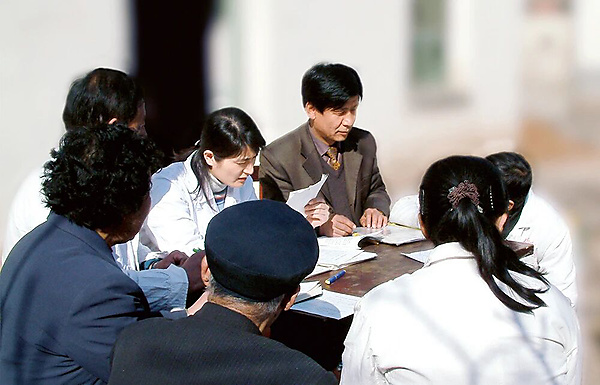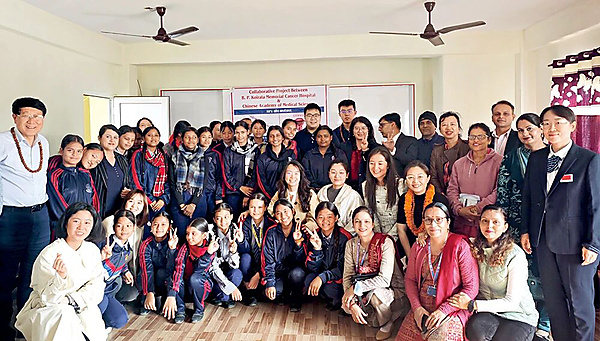Zhao Fanghui is a researcher, doctoral supervisor, distinguished professor at Peking Union Medical College and director of the Department of Cancer Epidemiology, National Cancer Center and Cancer Hospital, Chinese Academy of Medical Sciences. Her research focuses on the prevention and early detection of cancer; more specifically, research into ways to prevent cervical and breast cancers through comprehensive approaches. She is committed to improving health equity and accessibility for underserved regions, and especially vulnerable populations, and to advancing China's cancer prevention initiatives. She received the WHO/IARC Senior Visiting Scientist Award in 2015, and the APEC Healthy Women, Healthy Economies Research Prize in 2020. In 2025, she was honored as a National March 8th Red-Banner Holder.
Commitment to Preventive Medicine
"My initial goal was simple: To help people live healthier lives," Zhao says, recalling how she began her journey in studying preventive medicine. Witnessing the suffering of patients, even strangers, deeply affected her. "I couldn't bear to see people in pain," says Zhao. Empathy led her to choose preventive medicine — a field, unlike clinical medicine, which focuses on stopping diseases before they occur — as her specialty.
In 1993, Zhao enrolled in the preventive medicine program at Norman Bethune University of Medical Sciences (presently, Norman Bethune Health Science Center of Jilin University), in Changchun, a city in northeast China's Jilin Province. Preventive medicine focuses on the prevention and control of diseases, and it studies the patterns of disease prevalence and risk factors in the development of effective prevention and control strategies, thereby reducing the incidence of the diseases. "Preventive medicine is like an adventure — full of mystery, but with a bright and beautiful goal," Zhao says.
She was captivated by epidemiology, the foundation of preventive medicine, with its strong logical reasoning and clear evidence-based references. By studying epidemiology, Zhao learned how the subject could help her gain an in-depth understanding of the disease, in terms of etiology, screening, diagnosis and intervention, thereby controlling the occurrence and progression of the disease.
In 1998, Zhao pursued further studies at Peking Union Medical College, where she systematically learned cancer epidemiology, and where she participated in numerous research projects. Under the mentorship of Professor Qiao Youlin, a renowned epidemiologist, Zhao found her calling — cervical cancer prevention. "Professor Qiao not only guided me into the world of science, but also helped me to identify a meaningful research direction, cervical cancer control, and to build my self-confidence," Zhao says. Under Qiao's guidance, Zhao morphed from a shy student, who was hesitant to conduct fieldwork, into a confident researcher, who was passionate about conducting her work at the community level, and in engaging in academic exchanges.
Today, as a doctoral supervisor, Zhao nurtures her students with the same type of encouragement she once received. Her office shelves are adorned with students' photos and handmade gifts, many of which feature sunflowers, a symbol of the positivity she instills in her students. "I often tell my students to be like sunflowers, full of sunshine," she says. Zhao hopes to inspire the next generation to shine in the field of epidemiology, and to advance preventive medicine.
Dedication to Cervical Cancer Prevention
 |
| Zhao Fanghui conducted epidemiological survey in Xiangyuan County, Shanxi, in 2000. |
"No woman should die from cervical cancer," Zhao says. Cervical cancer is unique; it has a clear cause, can be prevented, and can potentially be eliminated. "HPV (human papillomaviruses) vaccination, to reduce infection risk, is for primary prevention; screening, to detect precancerous lesions, is for secondary prevention; and, standardized treatment for diagnosed cases, to improve survival and quality of life, is for tertiary prevention," Zhao says, explaining the three-tiered prevention strategy. The three tiers of prevention are interconnected and indispensable, Zhao emphasizes.
During the past two decades, Zhao has witnessed remarkable progress in cervical cancer control, from limited awareness to widespread societal engagement. During the late 1990s, HPV's link to cervical cancer became clearer, but China lacked epidemiological data. Zhao's team traveled nationwide to conduct screenings, and those surveys enabled her team to gain a deeper understanding of HPV prevalence and progression. "Understanding the disease's natural history allowed us to intervene, and to stop it at its source," Zhao says.
In 1999, as a master's student, Zhao joined a cervical-cancer-screening study in Xiangyuan, a county in Shanxi Province in north China, which was a high-risk area for cervical cancer. As she often traveled by overnight buses to rural clinics, Zhao worked tirelessly to identify the best screening methods and strategies for women across China's diverse regions. One case left a lasting impression on her: A woman, named Shen, whose mother and sister had died of cervical cancer, was saved thanks to early detection caught by Zhao's team during the free-screening campaign. While conducting fieldwork, Zhao witnessed effective prevention measures could help many women and their families, and she became more determined to help women protect their health, with expertise and effort.
A major breakthrough came in 2008, when Zhao's team developed a rapid, low-cost HPV DNA test tailored to developing countries. The test was the first of its kind in the world. "This technology revolutionized cervical-cancer screening," Zhao says. "It could detect 14 types of high-risk HPV DNA in cervical specimens. It delivers results in 2.5 hours, at one-tenth the cost of traditional methods, and it is simple enough for grassroots clinics."
Simultaneously, her team pioneered HPV vaccine trials in China. In 2016, the first imported HPV vaccine was approved, but Zhao knew domestic production was key to meeting the huge needs of Chinese women. "In 2019, we helped promote the launch of China's first domestically developed HPV vaccine. Thus, China became the third country globally to achieve this milestone, making great contributions to promoting global vaccine supply," Zhao says, with pride.
Toward Eliminating Cervical Cancer
In 2018, WHO announced a global strategic task to eliminate cervical cancer by the end of the century. In 2021, while leveraging 30 years of data, Zhao's team created China's predictive model for cervical cancer, and her team designed a pathway toward eliminating cervical cancer in China. "As the pathway was implemented in 2021, it is predicted elimination of cervical cancer will be achieved by 2046 in China's urban areas, and by 2050 in rural regions," Zhao says. This finding was highly valued by WHO's experts.
Zhao's work provided evidence for decision-making by the Chinese Government. In 2023, the Action Plan for Accelerating Elimination of Cervical Cancer (2023-2030) was released by China's National Health Commission, and other government departments. The plan calls for 50 percent of women, across the country, to receive screening services, and for 90 percent of patients to be treated for cervical cancer, by 2025. It is expected at least 70 percent of women in China will be screened for the disease by 2030.
Zhao and her team have been contributing to global efforts to eliminate cervical cancer. Zhao has been involved in six WHO guidelines development on cervical cancer prevention, and she has aided other developing countries in their efforts to combat the disease. In 2020, she donated her APEC prize money to Peking Union Medical College, her alma mater, to support and inspire young students in devoting their careers to global health governance, and to improving public health.
Into the future, Zhao plans to expand her focus to breast cancer, another disease that seriously threatens women's health. She is exploring AI-powered screening innovations to improve the quality and efficiency of breast-cancer screening.
 |
| Zhao Fanghui (third row, eighth from right) and her team provide HPV vaccination services to girls in Nepal. |
As she reflects on her journey, Zhao takes pride in the advancement of cervical cancer prevention in China. "Every step forward is a collective achievement," Zhao says. Even today, her team remains connected to Shen's family. Zhao is gratified that Shen's daughter has received regular screenings, and that Shen's granddaughter has received HPV vaccination.
Throughout the years, Zhao has participated in various science-popularization activities, to educate the public about cervical cancer prevention and control. "I will continue to help women learn about cervical cancer, and to help them understand the dangers of the disease, and the importance of prevention, so that women can take actions to safeguard their health," Zhao says.
Photos from Interviewee and Zhang Jiamin
(Women of China English Monthly August 2025)
Editor: Wang Shasha